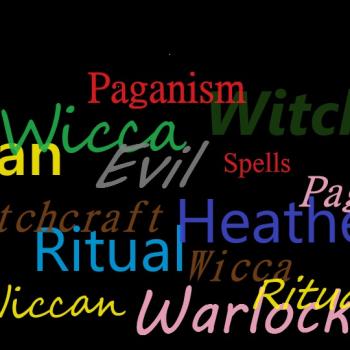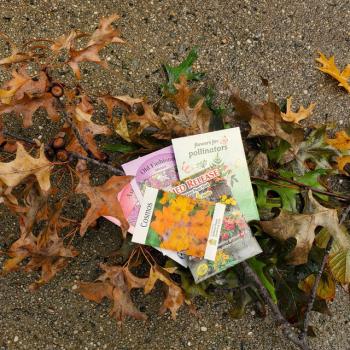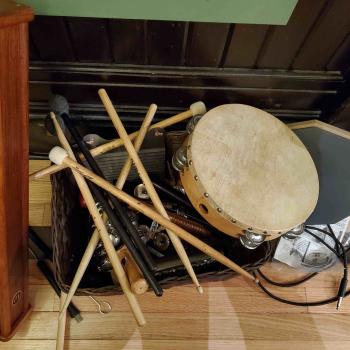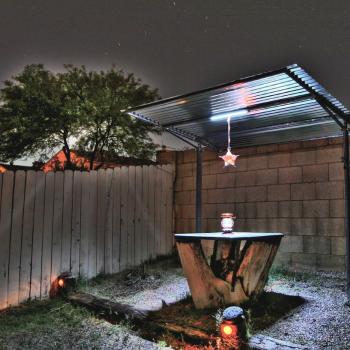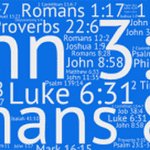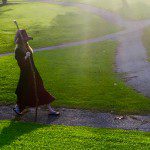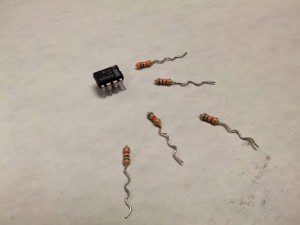 They say sometimes life feels like a great big circle, and sometimes you come around to a place that you feel like you’ve been before, but instead you should think of it like a widening spiral, and rather than coming back to the same place you’ve been, you’re actually on a new loop of the spiral, and you’re seeing it again from a different perspective. This can be a pretty reasonable metaphor for neo-paganism; we go back to look at something from a different perspective, and carry it forward with us, looping back every now and again to re-evaluate it and re-shape it as we spiral out. Apropos of that idea, this Sunday, May 17, Gaia Community is doing its first online ritual.
They say sometimes life feels like a great big circle, and sometimes you come around to a place that you feel like you’ve been before, but instead you should think of it like a widening spiral, and rather than coming back to the same place you’ve been, you’re actually on a new loop of the spiral, and you’re seeing it again from a different perspective. This can be a pretty reasonable metaphor for neo-paganism; we go back to look at something from a different perspective, and carry it forward with us, looping back every now and again to re-evaluate it and re-shape it as we spiral out. Apropos of that idea, this Sunday, May 17, Gaia Community is doing its first online ritual.
The online ritual was popular when I was having my earliest experiences of non-solitary paganism. This makes sense because the early days of my paganism coincided with the early days of the world wide web. Here we pagans were presented with an easily accessible model of that world that magical writers call “the astral” – a world that lay alongside our ordinary reality, and that could be altered by the power of imagination, the written word, and occasionally the barbarous tongue of markup language. In the mundane world, we might be the only pagan or witch we knew of, but in the chatroom or the channel, we could meet up virtually with dozens of reasonably like-minded folk, and practice together.
Eventually, I became affiliated with a local coven, and mostly left behind the world of online ritual. That world didn’t die when I left it, of course. Even as pagans and witches, magicians and druids, and members of dozens of other “new religious movements” became more and more present and public in the physical world, internet-based ritual continued alongside discussion groups, e-mail lists, and internet-enabled correspondence courses. Even now, a quick search reveals a handful of pagan groups and a UU congregation operating in Second Life, a much more detailed virtual world than we inhabited back in my “/me lights the candle in the east” days.
So I’m enjoying the idea of returning to the world of online ritual. Even without entering a fully built online world like Second Life, we have so many more ways to create our online “astral temples”. We’re planning to use Facebook, where I’m expecting that our ritual will take on a dreamlike, asynchronous shape of people working from wherever they are, posting their own prayers and invocations, sharing reactions and thoughts as they arise. The experience can now easily be enhanced by multi-media: here a photo of that virtual candle in the east, there a YouTube video of a chant to sing.
The idea for this ritual comes from our work over the past year with the goddess Danu. She charged us in a previous ritual to work to make connections between people, to gather in our far-flung tribe, and to welcome anyone who wanted to be a part of the work. We have about 25 members of the congregation who are in our local area, but hundreds of people following our Facebook page, including some who used to be local to us but have now moved away. Adopting an online ritual practice in addition to our weekly in-person services seems an excellent way to reach out and serve. This first online ritual will be a celebration of and meditation on our relationship to water, and will be dedicated to Danu. Anyone is welcome to attend. We’ll begin at 3 p.m. central time on Sunday, May 17th, 2015. Ritual will be held on Gaia Community’s Facebook group page. (https://www.facebook.com/groups/GaiaCommunity/)
I can’t say today whether this will succeed or fail, whether it will create a sense of community and mutual inspiration, or whether it will fall apart into nothingness. If it goes well, I expect that we’ll do it again from time to time as a supplement to our usual work. Even if it goes poorly, we’ll be looking for anything about it that does work, and trying to adapt those useful portions to future applications. One of the things I like most about my congregation is that we tend to think of ourselves as a group of seekers, and therefore are willing to experiment to see if some new thing will work or not. This holds even when it’s an old thing seen again from a new perspective. That’s how we grow.








